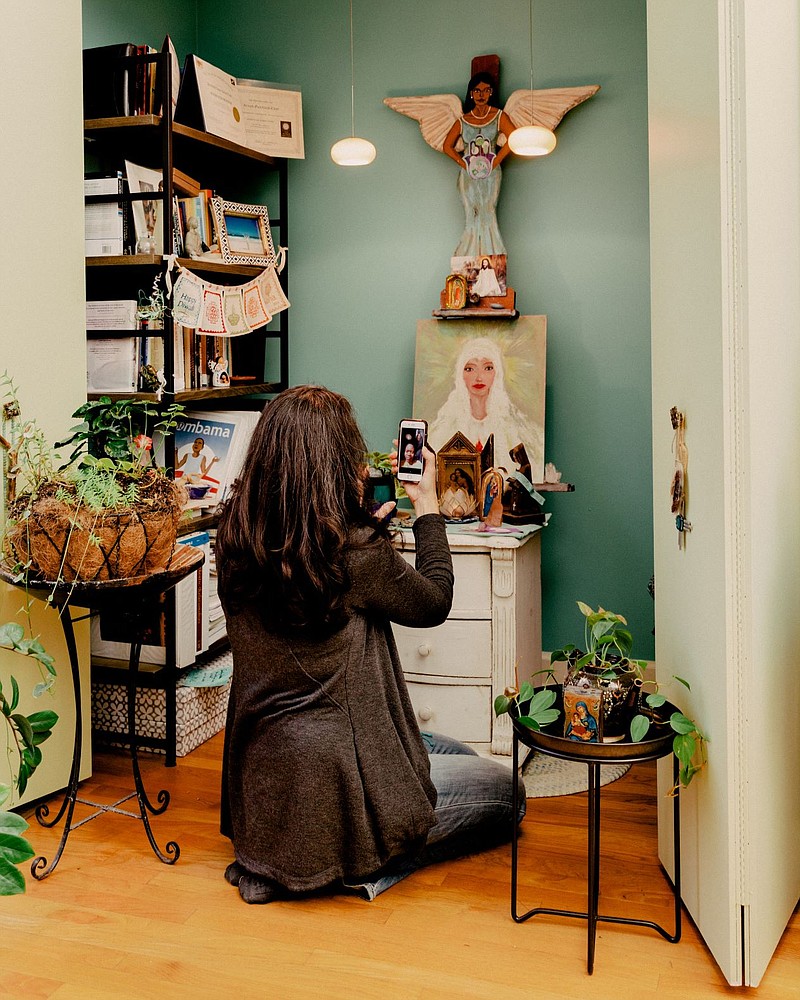Last spring, after a divorce, Qadeera Ingram needed someone to talk to. Specifically, she wanted to be able to speak about spirituality and the bigger picture of her life.
Although Ingram, a 33-year-old government contractor in Goose Creek, S.C., is Christian, she isn't a member of a church. So she hired Susan Pannier-Cass, a spiritual director and ordained minister, to talk about what she was experiencing, including raising her 6-year-old son in a pandemic at a time of widespread unrest.
In some of the virtual sessions, Ingram talked about her dreams, and Pannier-Cass would help her analyze them. In others, Ingram discussed elements of the natural world, how they made her feel closer to God. Pannier-Cass would encourage her "to go outside more and take my shoes off," Ingram said, "put my feet on the ground, just to reconnect with my center and what brings me peace."
Spiritual companions, also known as spiritual directors, are guides whose purpose is to listen deeply to clients and help them explore their spirituality, usually in a nondenominational capacity.
What they offer is not therapy; according to Spiritual Directors International, a nonprofit in Bellevue, Wash., the goal of meeting with a spiritual companion is to take a "meaningful step to help you find wholeness and balance in life, not to mention a sense of connection with however you might refer to God, Allah, The Universe, or the Ground of All Being, that which connects us all."
The practice has roots in many faiths, particularly the Jesuit branch of Catholicism, but contemporary spiritual directors come from a variety of religions.
"Most people come to spiritual direction looking for ultimate meaning, however they might define it. We don't define it for them," said Seifu Anil Singh-Molares, a Zen Buddhist priest and the executive director of Spiritual Directors International. (While spiritual direction is the more familiar term, he said, he favors "spiritual companion" because it is more inclusive.) "We support you in finding your own way to God, if that's how you describe it, or Brahman, or Tao."
SPACE FOR SEEKING
"Spiritual but not religious" is how 27% of Americans define themselves, according to a Pew Research Center survey from 2017. But one-quarter of American adults in an April survey from Pew reported that their religious faith has increased because of the pandemic.
For some seeking spiritual connection, this results in a hybrid approach. Alissa Ballot, 65, another of Pannier-Cass' clients and a retired lawyer in Chicago, was already a member of a synagogue when a retreat introduced her to spiritual companionship. She has found greater self-understanding by writing poetry at Pannier-Cass' suggestion, she said. Spiritual direction is helping her "become the me that God intended and created me to be."
Lucinda Clark, a spiritual director in Charlotte, N.C., said that in her experience, more Black clients, including clergy members, are seeking spiritual direction after George Floyd's death and the anger and protests that followed.
"That has been one of the main issues," said Clark, 51. "'How can I operate and work in my ministry in an environment that is unknowingly sometimes rejecting me and sometimes knowingly?' And so, some people are coming because they're hurt. They don't know how to move forward."
Clark, who completed a three-year spiritual direction program at Charlotte Spirituality Center, became a spiritual director after what she describes as "a dark night of the soul" in which she questioned certain ideologies in her church. She concluded that while she is rooted in Christianity, there are many paths to God.
Afterward, "I just knew that I needed to journey with other people, to partner with other people, so they didn't feel alone," she said. "I thought, 'I don't know the name of this thing that I'm supposed to do. I just know that I'm supposed to do it.'"
BOUNDARIES AND BEYOND
Spiritual directors, unlike therapists, are not licensed clinicians. They are not regulated by any agency. Nor does Spiritual Directors International, one of the biggest organizations dedicated to spiritual companionship, or smaller organizations like Spiritual Directors of Color Network, offer any kind of independent certification.
Training can vary depending upon the practitioner's faith background or educational preferences, but there are certificate programs through spiritual direction organizations and nonprofit ministries, including the Shalem Institute for Spiritual Formation in Washington. Emily Malcoun, a clinical psychologist in Philadelphia who has worked with a spiritual director, noted that while therapy "can provide expert help with healing from mental health symptoms," spiritual direction "focuses on your relationship with God or the divine" through prayer or reflection.
Some advocate for more accountability in the profession. Andree Grafstein, a spiritual director in Avon, Conn., described an incident of sexual harassment from a director about 40 years ago in an article she published last fall in Presence, a journal published by Spiritual Directors International; Grafstein said she has received supportive emails from other spiritual directors since its publication. "I look forward to a day when the reality of a spiritual director's sexual harassment becomes as visible as other forms of sexual abuse have become," she wrote.
Directees can be vulnerable, especially because, for some, rejection of organized religion or a former religious community is what brought them to a spiritual director in the first place. Kristabeth Atwood in Burlington, Vt., a spiritual director and former United Methodist minister, calls herself a pastor for people who don't go to church. Most of her directees "just don't resonate with being part of a traditional or formal religious community," she said.


